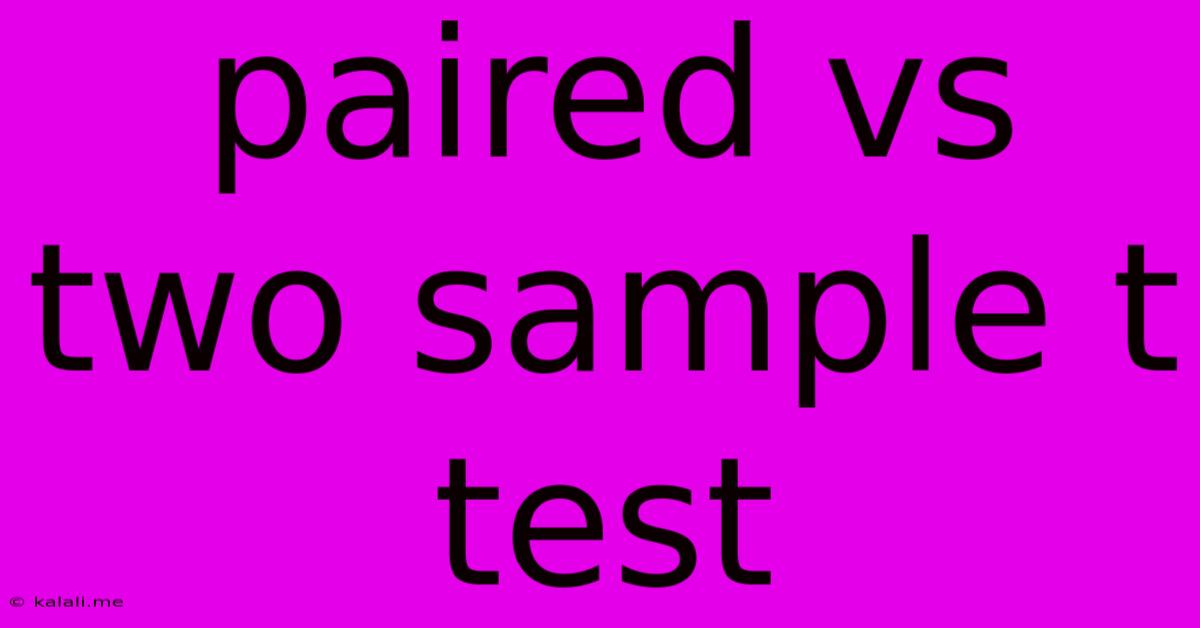Paired Vs Two Sample T Test
Kalali
May 31, 2025 · 3 min read

Table of Contents
Paired vs. Two-Sample t-Test: Choosing the Right Test for Your Data
Understanding when to use a paired t-test versus a two-sample t-test is crucial for accurate statistical analysis. Both tests compare the means of two groups, but they address different research questions and data structures. This article will clarify the distinctions, helping you select the appropriate test for your data and avoid misinterpretations. Choosing the wrong test can lead to inaccurate conclusions and flawed research.
What are t-tests? T-tests are used to determine if there is a statistically significant difference between the means of two groups. They are powerful tools in hypothesis testing, allowing researchers to draw inferences about populations based on sample data. The choice between a paired and two-sample t-test hinges on the dependence of the data.
Paired t-Test: Measuring Change Within the Same Subjects
A paired t-test, also known as a dependent samples t-test, analyzes the difference between two measurements taken on the same subjects or matched pairs. This is ideal for before-and-after studies, or when comparing two related groups. The key is that each data point in one group is directly linked to a corresponding data point in the other group.
Examples of when to use a paired t-test:
- Pre- and post-treatment comparisons: Measuring blood pressure before and after administering a new medication to the same patients.
- Matched-pairs design: Comparing the effectiveness of two different teaching methods on students who are carefully matched based on academic abilities.
- Repeated measures: Assessing the impact of a training program on the performance of the same individuals over time.
Key characteristics:
- Dependent samples: The data points are paired or matched.
- Focus on within-subject change: The test analyzes the difference between paired observations.
- Reduces variability: By analyzing the differences, the test effectively controls for individual variations, leading to higher statistical power.
Two-Sample t-Test: Comparing Independent Groups
A two-sample t-test, also called an independent samples t-test, compares the means of two independent groups. This means there's no relationship between the observations in the two groups. Each data point belongs to one group and is unrelated to any data point in the other group.
Examples of when to use a two-sample t-test:
- Comparing two different treatment groups: Evaluating the effectiveness of two different drugs on separate groups of patients.
- Comparing outcomes between two distinct populations: Analyzing the average income of men versus women.
- Comparing performance between two unrelated groups: Assessing the performance of students from two different schools on a standardized test.
Key characteristics:
- Independent samples: Observations in one group are not related to observations in the other group.
- Focus on between-group differences: The test directly compares the means of the two separate groups.
- Assumptions: Requires the assumption of equal variances between the two groups (though some variations of the test address unequal variances).
Choosing the Right Test: A Summary Table
| Feature | Paired t-test | Two-Sample t-test |
|---|---|---|
| Sample Type | Dependent (matched pairs, repeated measures) | Independent |
| Data Structure | Each observation in one group is paired with an observation in the other. | Observations in each group are unrelated. |
| Research Question | Does a treatment/intervention cause a change within the same subjects? | Is there a difference between the means of two separate groups? |
| Example | Pre- and post-test scores of the same individuals | Comparing the test scores of two different classes |
Making the Right Decision
Incorrectly choosing between a paired and a two-sample t-test can lead to inaccurate results and misleading conclusions. Carefully consider the relationship between your data points. If your data points are paired or matched, use a paired t-test. If your groups are independent, utilize a two-sample t-test. Always ensure your data meets the assumptions of the chosen test to guarantee the validity of your findings. Consulting with a statistician can provide valuable guidance if you are unsure which test is most appropriate for your specific research question.
Latest Posts
Latest Posts
-
Why Is The World Series Called The World Series
Jun 02, 2025
-
1 Chronicles 21 Why Was Census A Sin
Jun 02, 2025
-
Where Do You Get Cut In Pokemon Leaf Green
Jun 02, 2025
-
Can U Substitute Butter For Oil
Jun 02, 2025
-
Which Wire On An Extension Cord Is Hot
Jun 02, 2025
Related Post
Thank you for visiting our website which covers about Paired Vs Two Sample T Test . We hope the information provided has been useful to you. Feel free to contact us if you have any questions or need further assistance. See you next time and don't miss to bookmark.